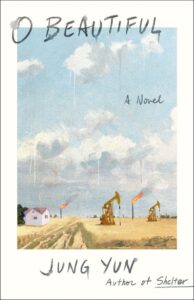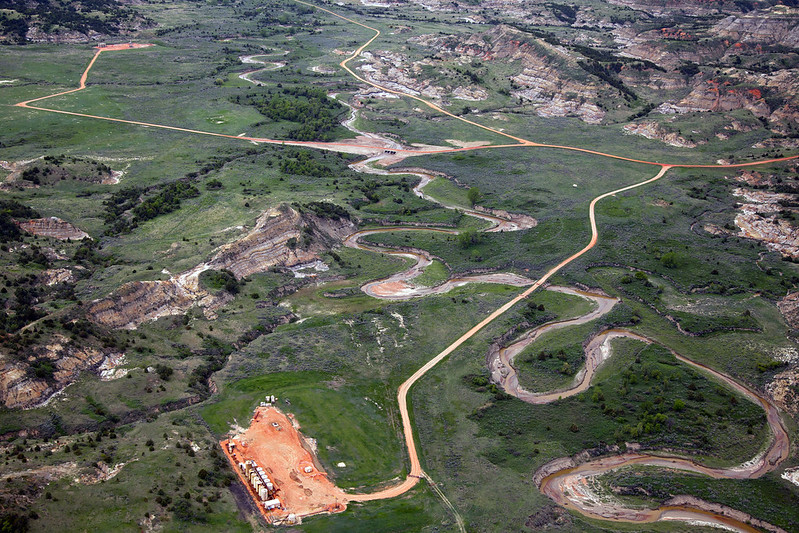
Land of opportunity? Or something sinister? Specific to one place? Or reflective of America? (North Dakota, 2012): O Beautiful brilliantly reads like you’re peeling an onion, one layer at a time, until you before the protagonist realize the story is “something much bigger.” “Something potentially more frightening” lurks.
Achingly beautiful, Jung Yun thoughtfully and perceptively exposes a small fictionalized Upper Midwest town, Avery, no one cared about until it became “the epicenter of the North American oil boom,” where forgotten real towns boomed. The novel’s message extends across America, reflecting a nation’s deep-seated discord.
On the surface, the story is about the powerful and the powerless. Underneath, like the oil rigs and “pumpjacks” that dig into the Bakken shale formation to extract the oil (fracking), the exposé digs deeper into other types of divides that separate the rich from the poor besides moneygrubbing. The isms are alive here – racism, sexism, classism, antisemitism, conservatism – as well as anti-ethnic with a focus on anti-Asian. The protagonist, Elinor Hanson, is Korean-American like the author.

via NCPA Photos on Flickr [CC BY-ND 2.0]
Set in 2012 at the height of the oil boom in North Dakota, where both Yun and Elinor once lived. Elinor on a military base, her father an engineer who worked on missiles; Yun’s parents immigrated to Fargo, a choice she describes in her dedication as “a strange and wondrous place to call home.” Today, the author and Elinor live in different states: Yun in Maryland (she teaches English at the George Washington University in DC); Elinor in New York City until she returns twenty years later to her home state for a ten-day, freelance assignment for a high-circulation business magazine, the Standard, believing it’s make-or-break given her later-in-life second chance career. Except she wasn’t prepared for the “volume, the crudeness of the comments being directed at her.” “Greater than anything she’s ever experienced before.”
The beauty in the title refers to the “golden grasslands” of a former landscape now ravaged by extreme capitalism and greed. Beyond the environmental degradation, the under layers are also the victims. Resentment, anger, and rage bubble beneath the surface, so the elegant prose bursts with grit. Like the “blade edge” of someone’s voice, the prose is edgy. The people are edgy. Elinor is edgy.
The reader is forewarned about one of Elinor’s vulnerabilities in the opening line: “Men talk to her on planes.” At forty-two, she was a model for twenty years. She too is beautiful, “too pretty.” Elinor burns hot and anxious when men view her as an object having been one for half her life, and women begrudge her. On page seven, Yun offers another few meaningful words: “She’s not the stupid girl she used to be.” Well, you may beg to differ as you read what happens, but agree that a year out of graduate school she’s emotionally invested in journalism and telling the truth.
Her vulnerabilities also stem from a childhood of being viewed as “exotic.” “Compared to whom?” the narrator asks. An attitude painfully wrapped up in her parent’s loveless marriage. Her father intentionally traveled to South Korea to bring home someone akin to a “mail-order” wife, stereotyping Asian women as submissive, dutiful, knowing their place. Her mother was all those things, never fitting in with the other wives on the base. Until one day she escapes a demeaning life even when it means abandoning Elinor and her slightly older sister. Back then the two were close, needing each other. Today you’ll see how angst-ridden their relationship is and why.
Elinor struggles with identity issues – judged too Asian for North Dakota and not Asian enough in New York City. Guarded and distrustful, she has few, if any, friends. What she did have was a love affair with her former “distinguished” English professor Richard Hall, who one day out-of-the-blue (since they’d broken up a while ago) called to ask if she would take over a North Dakota story he’d been working on for months. His angle: “insiders and outsiders.”
Throughout her disorienting and unsettling stay, Elinor wonders why he gave her the assignment. His editor thought a good idea since she knew Avery Before. The problem is the Avery After sets Elinor up for emotional havoc as she senses, observes, and decides his storyline will not get to the bottom of the real story.
What does Elinor do?
Richard gives Elinor carte-blanche to use his files, thick with articles on the “history, business, geology, sociology, public health, popular culture . . . census figures, environmental studies, historical photos, news clippings, crime stats, oil industry reports.” Plus he contacts all the people he was going to interview to smooth the way for her. Each time she does, she learns he referred to her as his student, which bothers her fiercely. She wants to get out from under his dominance and be seen as a serious journalist.
It doesn’t take Elinor too long to appreciate the people on Richard’s list are the powerful, not the powerless. One interview especially stands out: when she’s heartily welcomed by excessively friendly Randy, Chairman of the Mahua tribe. The reservation isn’t far from town, sitting on oil, thus he’s celebratory. What she doesn’t understand until much later is why his twenty-something female assistant Shawnalee is so hostile and rude to her. Despite the tribe striking it rich, an underbelly story is playing out. The tribe appears to be fictionalized, but seems to be based on the tribal nation on the Fort Berthold Reservation: Mandan, Hidatsa, and Arikara Nation.
Understandably and empathetically, oil/money pulls Native Americans out of poverty (40% says Randy), yet I still found it surprising that the tribes didn’t treat their land as sacred as others do, like the Navajo and Hopi Nations in the Southwest for examples. This BBC video tells us what can happen when money is seen as the most sacred. Warning, it’s not good:
What Elinor perceives on the reservation she also sees all over the town. From the “ugly sprawl of development” to polluted air smelling like “Vaseline,” to water contamination, increased crime, sexual assaults (men often described as “roughnecks” in a town where men significantly outnumber women), drugs, violence, price gouging ($480 a night at the Thrifty Inn Elinor stays in!), traffic congestion, noise pollution, “housing insecurity.” Victimization everywhere she goes.
Everywhere there’s also frustrating long lines: waiting for food, registering at a dingy motel (the only vacant room she can find), and at a depressing bar where women lower their expectations for any man’s attention.
Issues of complex land rights out West – surface rights versus mineral and water rights – aren’t new but the novel brings out the deception of unsuspecting ex-wheat farmers who sold the rights to dig under their land in the 70s when no one could imagine what would happen fifty years later.
Other societal issues are part of the layers. “She sees more prosthetic limbs than she has ever seen in one place,” as the “oil companies supposedly love hiring vets.” They’ve done their duty in the Iraq and Afghanistan wars and willing to take on dangerous jobs when the rest of America has forgotten them.
“Writing has always been her way of making sense of the world,” says the author of Elinor. Through her character, Jung Yun’s O Beautiful helps us make sense of a highly-divisive world.
Lorraine